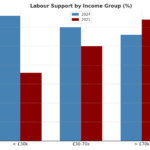Britain’s Carefully Orchestrated Flattery of Trump
LONDON — Britain rolled out its oldest tricks of statecraft when President Donald J. Trump returned this summer for an “unprecedented” second state visit. The carriages, the uniforms, the banquets in Windsor Castle were not just theatre. They were a strategy — carefully designed to flatter a president known to crave ceremony while insulating him from protest and risk.
Every detail was orchestrated. King Charles “happened” to be in residence at Windsor, offering a regal setting away from central London. Prime Minister Keir Starmer staged his hospitality at Chequers, the country retreat in Buckinghamshire, not Downing Street. The itinerary kept Mr. Trump far from Mayor Sadiq Khan’s capital and the demonstrations that had marred his earlier visit.
Security was central. With the memory of the July 13, 2024, attempted assassination of Mr. Trump at a Pennsylvania rally still fresh — and following the September 2025 fatal shooting of activist Charlie Kirk in Utah — the U.S. Secret Service insisted on minimising exposure. Processions were tightly controlled, routes pared back, and venues hardened. Britain’s own services complied.
Breaking Precedent
By convention, state visits are once per presidency. Extending another to Mr. Trump broke protocol, and Mr. Starmer admitted as much. The rationale, he said, was “strategic”: Britain needed to secure American investment in artificial intelligence, healthcare, and nuclear power.
The calculus was simple: indulge Mr. Trump’s appetite for grandeur, and Britain might gain access and leverage.
At Windsor, the tableau was textbook. Mr. Trump dined in St. George’s Hall beneath portraits of monarchs past. Cameras broadcast the imagery: Britain’s monarchy lending weight to an American president. The symbolism was unmistakable.
The Business Forum
Alongside the pageantry, Britain convened corporate leaders: Microsoft, DeepMind, Blackstone, major healthcare investors. Announcements followed: pledges for AI data centers, commitments to biomedical research, talk of nuclear cooperation.
Government releases hailed a breakthrough. Britain, they claimed, had secured a role as America’s indispensable partner in the industries of the future.
Yet much of it was theatre, too. Microsoft’s “new” investment was part of a global program: data centers are being built in the United States, Europe, and Asia. Britain was a stop on a rollout that would have happened anyway. Blackstone’s praise was warm, but its deepest capital commitments remain firmly anchored in the U.S.
The pledges were promises, not contracts.
Sidestepping the Hard Issues
More difficult matters went untouched. U.S. tariffs on British steel and aluminium, long a grievance in London, were left unresolved. Officials privately conceded no guarantees had been given.
The broader hope of a U.S.–UK trade deal remained thin. Analysts described it as narrow and selective, “question-raising” rather than transformative. Post-Brexit, Britain has limited leverage.
In truth, America does not need Britain. It can site data centers wherever energy is cheapest and supply chains strongest. It can expand healthcare markets at home. Britain’s offerings are limited — and its bargaining position weaker than it admits.
The Strategy of Managed Theatre
Critics saw desperation in the flattery. The Guardian dismissed the visit as “nostalgia politics.” Sadiq Khan accused the government of normalising Trump’s divisive rhetoric. Channel 4 aired a special reel cataloguing Mr. Trump’s falsehoods, an implicit rebuke to the official spectacle.
But officials defended the strategy. Without the ceremony, they argued, Britain would have had little access. The gilded optics mattered to Mr. Trump — and in diplomacy, optics are often the coin of the realm.
By that measure, the visit succeeded. Mr. Trump was visibly gratified. Royal pageantry dominated U.S. coverage. Protests were avoided. No security incidents occurred.
Verdict
The week was orchestrated with precision: Windsor instead of London, Chequers instead of Downing Street, secure venues instead of open streets. It kept Mr. Trump away from demonstrations, away from Khan’s city hall, and away from risk. After the trauma of Pennsylvania in 2024 and the shock of Kirk’s killing in 2025, the Secret Service got the caution it demanded.
Britain, for its part, got the images it wanted.
But beyond the spectacle, America conceded little. Its corporations will build where they please. Its tariffs remain in place. Its trade posture is unchanged.
In the cold ledger of diplomacy, Britain flattered, America smiled — and nothing material shifted.
You might also be interested in:
Chandeliers in Windsor, Drizzle in London: Britain’s Theatre of Power Meets the Reality of Decline

